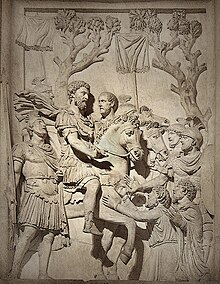Tiberius Claudius Pompeianus | |
|---|---|
 Marble relief of Tiberius Claudius Pompeianus (center right) with Emperor Marcus Aurelius in the Capitoline Museums in Rome | |
| Consul of the Roman Empire | |
| In office 173 AD – 173 AD Serving with Gnaeus Claudius Severus | |
| Preceded by | Servius Calpurnius Scipio Orfitus and Sextus Quintilius Maximus |
| Succeeded by | Lucius Aurelius Gallus and Quintus Volusius Flaccus Cornelianus |
| Military Governor of Pannonia Inferior | |
| In office 164 AD – 168 AD | |
| Suffect Consul of the Roman Empire | |
| In office 162 AD – 162 AD Serving with Tiberius Claudius Paullinus | |
| Preceded by | Junius Rusticus and Lucius Titius Plautius Aquilinus |
| Succeeded by | Marcus Insteius Bithynicus and ignotus |
| Personal details | |
| Born | 125 AD Antioch, Syria, Roman Empire (modern-day Antakya, Hatay, Turkey) |
| Died | 193 AD (aged 68) Rome, Roman Empire (modern-day Rome, Italy) |
| Spouse | Lucilla (m. 169; d. 182) |
| Children | Lucius Aurelius Commodus Pompeianus, Tiberius Claudius Pompeianus Quintianus |
Tiberius Claudius Pompeianus[1] (Greek: Πομπηιανός; c. 125 – 193 AD) was a politician and military commander during the 2nd century in the Roman Empire. A general under Emperor Marcus Aurelius, Pompeianus distinguished himself during Rome's wars against the Parthians and the Marcomanni. He was a member of the imperial family due to his marriage to Lucilla, a daughter of Marcus Aurelius, and was a key figure during the emperor's reign. Pompeianus was offered the imperial throne three times, though he refused to claim the title for himself.